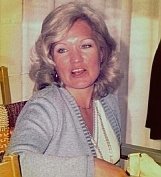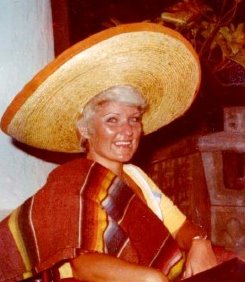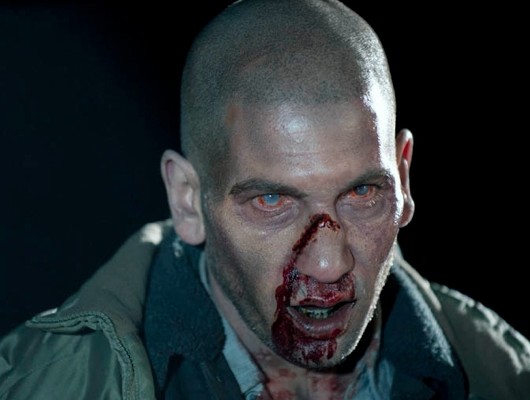
My aunt Kathy died last week, quite unexpectedly. She had a year-long bout with polio as a very young child and never walked again. She spent her whole life confined to a wheelchair or iron leg braces, never free from the complications of post-polio syndrome. For my aunt, pain was inextricable from life, varying only in degree.
At her funeral, it was only natural that her friends and family expressed gratitude amidst our grief for her release from suffering. But as I listened to my aunts and uncles speak about her life, I couldn’t help but consider the role suffering had played in the formation of her character.
My aunt had a gravity to her, of course. Everyone who lives in pain does. She had a beauty to her as well, one that I was always struck by. I don’t ever think of her as being beautiful, and yet every time I saw her I was surprised to see that beauty. It wasn’t the kind of beauty one sees in magazines or movies, the kind of physical beauty that some people are born possessing; it was her eyes, the tilt of her chin, the set of her mouth. It was the kind of beauty that’s been burned into a person.
One of her friends talked about how Kathy fought hard to make the world an easier place for disabled people to navigate, and she did. She fought hard to help other polio survivors. She also fought hard to keep herself independent. She didn’t want to burden her family. She loved her family, us, very much, and to my mind, in a better way than we tend to love each other. She was never tangled up in the gossip and pettiness that families are prone to. It seems strange to me now that I never really wondered why she was never involved…she just seemed to inhabit a different sphere than the one where family drama flourished.
Which is not to say that she was out of the loop. She wasn’t. When the Ogre and I moved to Vegas, I was only the second child in generations to leave Texas, and my cousin came back pretty quickly. It was a hard move for me, coupled as it was with Charlotte’s arrival a few months later. My aunt, living on disability and trying to make what money she could here and there to make ends meet, sent me a package of little decorative things for the girls. Flowered hooks and name plates for their room, and hats and scarves she had knitted herself. The kind of purely decorative things I’d never be able to afford, which she knew, because she really couldn’t afford those kinds of things either.
I don’t know how much of these memories are whitewashed because of my youth. I certainly didn’t know her the way her siblings did, or even the way my older cousins did. I don’t mean to suggest that she led a life of heroic martyrdom. It would be an insult to who she was to suggest she was some kind of whited sepulchre in a wheelchair. She was a pack-rat who smoked cigarettes and loved politics, makeup, and her dogs. She thought her fellow baby boomers were a stand-up generation. And in the end, I think her unwillingness to burden anyone might have driven away people who wanted to love her. Despite more than one marriage proposal in her youth, she died as she lived…alone.
I can’t imagine what her life might have been like if she hadn’t had polio. It might have been better, or it might have been worse. She might have suffered more or less. But she only had the one life, and it was marked by disease and pain. What she suffered shaped her life, but the way she suffered made her who she was: the oldest sister whose sisters clambered aboard her wheelchair and rode it with her down steep hills. The paralyzed girl who wanted nothing more than freedom of movement, and who said, after a disastrous attempt at parasailing ended with the parasail tangled in her wheelchair and pulling her along the beach at 50 miles per hour, “that was so wonderful! I was going so fast!” The woman whose first wheelchair-enabled car gave her a life she had only dreamed about. The aunt who was denied what her nieces and nephews took for granted, a happy, healthy childhood with two legs to run on, but who never refused any of us a ride on her wheelchair, and who laughed when the babies grabbed the joystick and made her jerk left or backwards mid-conversation.
Suffering was a part of my aunt’s life that she never spoke of or complained about. It was an ever-present reality for her, but the depth and breadth of her suffering was a revelation to me. I knew abstractly that she must have experienced pain, but she endured it patiently, silently, and without bitterness. She accepted suffering gracefully and allowed it to refine her, rather than allowing herself to be defined by it. While I wish she hadn’t had to suffer so much, I don’t wish she had been someone different. Pope John Paul II said that “Christ wishes to be united with every individual, and in a special way he is united with those who suffer.” In whatever way her suffering united my aunt with Christ, it was a good suffering, and it engendered a goodness in her that might not otherwise have been.
So while I can say that I am grateful that her suffering has ended, I can also say that for her life and all she suffered, Deo gratias.
Eternal rest grant unto her, O Lord, and let perpetual light shine upon her.












